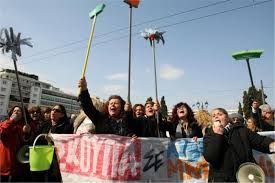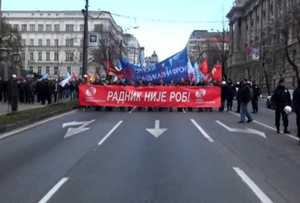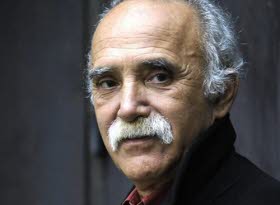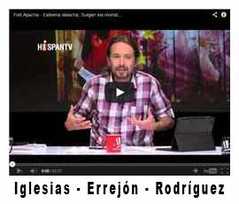A call: Jewish survivors and descendents of survivors of Nazi genocide unequivocally condemn the massacre of Palestinians in Gaza
![2014-08-13 06 gaza jews for palestine]() As Jewish survivors and descendants of survivors of the Nazi genocide, we unequivocally condemn the massacre of Palestinians in Gaza and the ongoing occupation and colonization of historic Palestine. We further condemn the United States for providing Israel with the funding to carry out the attack, and Western states more generally for using their diplomatic muscle to protect Israel from condemnation. Genocide begins with the silence of the world
As Jewish survivors and descendants of survivors of the Nazi genocide, we unequivocally condemn the massacre of Palestinians in Gaza and the ongoing occupation and colonization of historic Palestine. We further condemn the United States for providing Israel with the funding to carry out the attack, and Western states more generally for using their diplomatic muscle to protect Israel from condemnation. Genocide begins with the silence of the world
We are alarmed by the extreme, racist dehumanization of Palestinians in Israeli society, which has reached a fever pitch. In Israel, politicians and pundits in The Times of Israel and The Jerusalem Post have called openly for genocide of Palestinians, and right-wing Israelis are adopting Neo-Nazi insignia
Furthermore, we are disgusted and outraged by Elie Wiesel’s abuse of our history in these pages to promote blatant falsehoods used to justify the unjustifiable: Israel’s wholesale effort to destroy Gaza and the murder of nearly 2,000 Palestinians, including many hundreds of children. Nothing can justify bombing UN shelters, homes, hospitals and universities. Nothing can justify depriving people of electricity and water
We must raise our collective voices and use our collective power to bring about an end to all forms of racism, including the ongoing genocide of Palestinian people. We call for an immediate end to the siege against and blockade of Gaza. We call for the full economic, cultural and academic boycott of Israel. “Never again” must mean NEVER AGAIN FOR ANYONE!
 On 18 September 2014 one of the most important votes in the history of the British state will take place when people living in Scotland have the opportunity to vote on whether the country should become independent from the rest of Britain.
On 18 September 2014 one of the most important votes in the history of the British state will take place when people living in Scotland have the opportunity to vote on whether the country should become independent from the rest of Britain. 

 L'association Attac Maroc salue le courage des 595 femmes de ménage grecques de la Fonction publique, en lutte depuis 11 mois contre leur licenciement et les mesures d'austérité et de dégraissage de la Fonction publique imposées par le gouvernement grec sous tutelle des Institutions financières internationales et de l'Union européenne.
L'association Attac Maroc salue le courage des 595 femmes de ménage grecques de la Fonction publique, en lutte depuis 11 mois contre leur licenciement et les mesures d'austérité et de dégraissage de la Fonction publique imposées par le gouvernement grec sous tutelle des Institutions financières internationales et de l'Union européenne. After the Second World War, in a growing number of Third World countries, policies diverged from those of the former colonial powers. This trend encountered firm opposition from the governments of the major industrialised capitalist countries whose influence held sway with the World Bank (WB) and the IMF. WB projects have a strong political content: to curtail the development of movements challenging the domination/rule of major capitalist powers. The prohibition against taking “political” and “non-economic” considerations into account in WB operations, one of the most important provisions of its charter, is systematically circumvented. The political bias of the Bretton Woods institutions is shown by their financial support to dictatorships ruling in Chile, Brazil, Nicaragua, Congo-Kinshasa and Romania.
After the Second World War, in a growing number of Third World countries, policies diverged from those of the former colonial powers. This trend encountered firm opposition from the governments of the major industrialised capitalist countries whose influence held sway with the World Bank (WB) and the IMF. WB projects have a strong political content: to curtail the development of movements challenging the domination/rule of major capitalist powers. The prohibition against taking “political” and “non-economic” considerations into account in WB operations, one of the most important provisions of its charter, is systematically circumvented. The political bias of the Bretton Woods institutions is shown by their financial support to dictatorships ruling in Chile, Brazil, Nicaragua, Congo-Kinshasa and Romania. There is no doubt. The moment of truth approaches. But which? The coming months will be worth years. For better or worse they can lead to an acceleration and a point of irreversible movement towards the breaking of the institutional framework created in 1978, or can represent the epic collapse of the process initiated in 2012, leaving behind a legacy of cynicism and frustration without comparison.
There is no doubt. The moment of truth approaches. But which? The coming months will be worth years. For better or worse they can lead to an acceleration and a point of irreversible movement towards the breaking of the institutional framework created in 1978, or can represent the epic collapse of the process initiated in 2012, leaving behind a legacy of cynicism and frustration without comparison. James Robertson: Let’s start with a brief history of the Initiative for Democratic Socialism (IDS) and its role in the formation of the Združena levica (UL, United Left) earlier this year. What are the origins of IDS?
James Robertson: Let’s start with a brief history of the Initiative for Democratic Socialism (IDS) and its role in the formation of the Združena levica (UL, United Left) earlier this year. What are the origins of IDS?  IN HIS AGE of Extremes, the great Marxist historian Eric Hobsbawm marked the start of World War I in August, 1914 as the beginning of the “short twentieth century.”
IN HIS AGE of Extremes, the great Marxist historian Eric Hobsbawm marked the start of World War I in August, 1914 as the beginning of the “short twentieth century.” The Second International and the First World War – Responding to capitalist global disaster: 1914 and today
The Second International and the First World War – Responding to capitalist global disaster: 1914 and today The United States cancelled the debts of some of its allies. The most obvious instance of this kind was the way the German debt was largely cancelled by the 1953 London Agreement. In order to make sure that the economy of West Germany would thrive and thus become a key element of stability in the Atlantic bloc, the creditor allies led by the United States made major concessions to German authorities and corporations - concessions that went beyond debt relief. A comparison between the way West Germany was treated after WWII and the current attitude to developing countries or to Greece today is a telling story.
The United States cancelled the debts of some of its allies. The most obvious instance of this kind was the way the German debt was largely cancelled by the 1953 London Agreement. In order to make sure that the economy of West Germany would thrive and thus become a key element of stability in the Atlantic bloc, the creditor allies led by the United States made major concessions to German authorities and corporations - concessions that went beyond debt relief. A comparison between the way West Germany was treated after WWII and the current attitude to developing countries or to Greece today is a telling story. As Jewish survivors and descendants of survivors of the Nazi genocide, we unequivocally condemn the massacre of Palestinians in Gaza and the ongoing occupation and colonization of historic Palestine. We further condemn the United States for providing Israel with the funding to carry out the attack, and Western states more generally for using their diplomatic muscle to protect Israel from condemnation. Genocide begins with the silence of the world
As Jewish survivors and descendants of survivors of the Nazi genocide, we unequivocally condemn the massacre of Palestinians in Gaza and the ongoing occupation and colonization of historic Palestine. We further condemn the United States for providing Israel with the funding to carry out the attack, and Western states more generally for using their diplomatic muscle to protect Israel from condemnation. Genocide begins with the silence of the world July 17th witnessed one of the largest social protests in Serbia since the beginning of the global financial crisis. Around 10000 people, mainly public sector workers, marched through the streets of Belgrade against the “economic reform legislative package” including the latest incarnation of the Labour law. This will, among other things, severely deregulate the labour market, making it even easier for “entrepreneurs” (as capital owners and managers are lovingly referred to by the government controlled media) to sack workers and cut wages and severance pay (thus legalising practices already commonplace in contemporary Serbia), which has, in one form or another, been on the agenda of all post-Milosević governments in Serbia.
July 17th witnessed one of the largest social protests in Serbia since the beginning of the global financial crisis. Around 10000 people, mainly public sector workers, marched through the streets of Belgrade against the “economic reform legislative package” including the latest incarnation of the Labour law. This will, among other things, severely deregulate the labour market, making it even easier for “entrepreneurs” (as capital owners and managers are lovingly referred to by the government controlled media) to sack workers and cut wages and severance pay (thus legalising practices already commonplace in contemporary Serbia), which has, in one form or another, been on the agenda of all post-Milosević governments in Serbia. Michel Warschawski (né en 1949 à Strasbourg) est un journaliste et militant pacifiste d'extrême gauche israélien, cofondateur et président du Centre d'information alternative de Jérusalem et ancien président de la Ligue Communiste Révolutionnaire Marxiste israélienne.
Michel Warschawski (né en 1949 à Strasbourg) est un journaliste et militant pacifiste d'extrême gauche israélien, cofondateur et président du Centre d'information alternative de Jérusalem et ancien président de la Ligue Communiste Révolutionnaire Marxiste israélienne. La aparición en la escena política de partidos ultraderechistas como Amanecer Dorado, la Liga Norte, el Frente Nacional Francés, PxC o España2000 en España, no hacen sino constatar, como ya resumió el dirigente británico del BNP, Nick Griffin, que las condiciones actuales representan la tormenta perfecta para su crecimiento.
La aparición en la escena política de partidos ultraderechistas como Amanecer Dorado, la Liga Norte, el Frente Nacional Francés, PxC o España2000 en España, no hacen sino constatar, como ya resumió el dirigente británico del BNP, Nick Griffin, que las condiciones actuales representan la tormenta perfecta para su crecimiento. China is not an “emerging country” but a power that has emerged. It is not a “sub-imperialism” ensuring order in its own region, but an imperialism “in formation.” The new Chinese bourgeoisie is aiming to play in the big league. The success of its enterprise is still far from assured, but this ambition determines its international policies, both economic and military.
China is not an “emerging country” but a power that has emerged. It is not a “sub-imperialism” ensuring order in its own region, but an imperialism “in formation.” The new Chinese bourgeoisie is aiming to play in the big league. The success of its enterprise is still far from assured, but this ambition determines its international policies, both economic and military. Dans une Interview exclusive de Jean-Luc Mélenchon au site payant Hexagones [
Dans une Interview exclusive de Jean-Luc Mélenchon au site payant Hexagones [ An abridged version of this letter calling for the UN and governments to impose a military embargo on Israel was published in the Guardian on July 19 2014 [1].
An abridged version of this letter calling for the UN and governments to impose a military embargo on Israel was published in the Guardian on July 19 2014 [1].